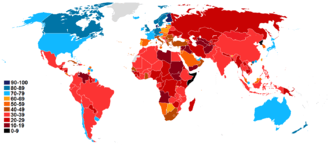Corruption in Brazil
| Political corruption |
|---|
 |
| Concepts |
| Corruption by country |
| Europe |
| Asia |
| Africa |
| North America |
| South America |
| Oceania and the Pacific |
| Transcontinental countries |
Corruption in Brazil is a pervasive social problem. In the 2015 Corruption Perceptions Index, Brazil tied with Bosnia and Herzegovina, Burkina Faso, India, Thailand, Tunisia, and Zambia, ranking 76th among 168 countries.[1] Corruption was cited among many issues that provoked the 2013 protests in Brazil.[2]
Legal framework
Brazil is often cited for its strong legal framework aimed at curbing corruption and is considered a role model when establishing anti-corruption legal frameworks in developing countries; Nevertheless, enforcement remains weak. Corruption is an important part of Brazil's politics. For years, embezzlement and corruption have been involved in Brazilian elections, and yet the electorate continues to vote for the same convicted politicians.[3]
To counteract widespread corruption in the private and public sector, Brazil has enacted the Clean Company Act 2014 (Law No. 12, 846). According to the Act, companies are responsible for the corrupt practices of their employees and can be held liable without a finding of fault. Bid rigging and fraud are prohibited in public procurement, as well as bribery of Brazilian public officials. If found guilty of corruption the companies can be suspended, dissolved or fined.
Political corruption
Petrobras
In 2014 a bribery scheme surfaced within the state-owned oil company that gave the scandal its name. Executives at Petroleo Brasileiro SA (Petrobras) took bribes from contractors and funneled money into the campaign funds of the governing political parties.[4]
Police corruption
Police corruption is also common with gangs made up of policemen, firemen, guards, prison guards, and military soldiers known as militia. Ironically, corrupt police officers usually embark on a life of crime for the same reasons as the drug traffickers: poverty, lack of education and low ambition (poverty even more common among the military).
The militia control some favelas often imposing curfews enforced with violence. The threat of war is always imminent. Drug gangs wanting to rid themselves of rules imposed by the militia, demand that people don’t support the militia under the threat of death. As a result, residents live under a series of complicated and dangerous relationships[5]
See also
References
- ↑ 2015 Corruption Perceptions Index
- ↑ What's REALLY behind the Brazilian riots? CNN June 14, 2013
- ↑ [url=http://www.dw.de/the-persistence-of-corruption-in-brazilian-politics/a-17974970 The persistence of corruption in Brazilian politics]
- ↑ Simon Romero (April 3, 2016). "Insider's Account of How Graft Fed Brazil's Political Crisis". New York Times.
- ↑ Policiaos corruptos e milicias
